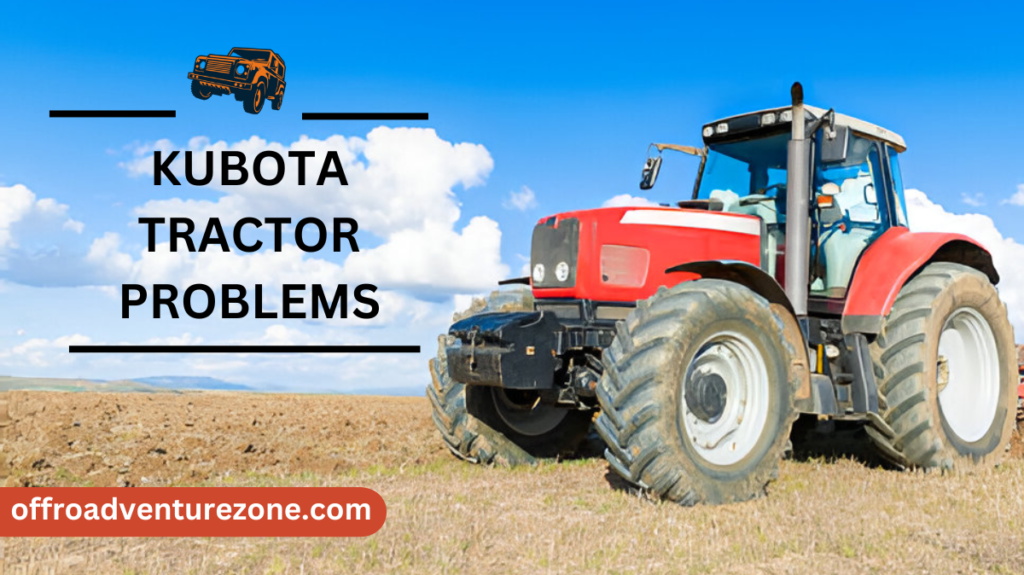Kubota tractors are known for their reliability and strength. However, like any machine, they can face issues over time. Understanding these problems can help you keep your tractor running smoothly. We will explore common Kubota tractor troubles and ways to solve them.

Overview of Kubota Tractors
Kubota has been making tractors for many years. They come in different sizes for various jobs. Some are small for home gardens, while others are big for large farms.
Kubota tractors are famous for their orange color and strong build. They can do many tasks like plowing fields, moving heavy loads, and mowing grass.
Importance of Maintenance
Taking care of your Kubota tractor is very important. Regular maintenance helps prevent many problems before they start. It’s like going to the doctor for check-ups to stay healthy. When you maintain your tractor well, it lasts longer and works better. This saves you money in the long run and keeps your tractor working when you need it most.
Top 5 Most Common Kubota Tractor Problems
Let’s look at the most frequent issues Kubota tractor owners face. Knowing these can help you spot problems early and fix them quickly.
Engine Starting Issues
Sometimes, a Kubota tractor won’t start. This can be frustrating, especially when you have work to do. Often, the problem is with the battery. It might be old or not charged enough.
Other times, the fuel filter might be clogged, stopping fuel from reaching the engine. Cold weather can also make starting harder. In some cases, the starter motor might be worn out and need replacing.
Hydraulic System Failures
The hydraulic system is like the muscles of your tractor. It helps lift heavy things and move parts. When it fails, your tractor can’t do its job well. Common hydraulic problems include leaks in hoses or seals.
Sometimes, the hydraulic fluid gets dirty or low, causing issues. You might notice the tractor’s arms moving slowly or not lifting as much weight as before. These are signs of hydraulic trouble.
Transmission Issues
The transmission helps your tractor change speeds and power. Problems here can make your tractor hard to drive or stop it from moving at all. You might hear strange noises or feel jerky movements.
Sometimes, gears can wear out or break. Low transmission fluid can also cause problems. If you notice your tractor slipping out of gear or not shifting smoothly, it might have transmission issues.
Overheating Problems
Tractors work hard and can get very hot. When they get too hot, it’s called overheating. This can damage the engine badly. Overheating can happen if the coolant is low or if the radiator is dirty.
Sometimes, the water pump that moves coolant around might break. You might see steam coming from under the hood or smell something burning. The temperature gauge on your dashboard will show high heat.
Electrical Issues
Kubota tractors have many electrical parts. These help start the engine, run lights, and power tools. When electrical problems happen, many things can go wrong. Lights might not work, or gauges might show wrong information.
Sometimes, fuses blow or wires get loose. In worse cases, the alternator that charges the battery might fail. Electrical issues can be tricky because they’re hard to see.
Preventing Kubota Tractor Problems
Stopping problems before they start is the best way to keep your tractor healthy. Here are some ways to prevent common issues.
Regular Maintenance Tips
Regular maintenance is key to a happy tractor. Change the oil and filters as the manual says. This keeps the engine clean inside. Check fluid levels often, including engine oil, hydraulic fluid, and coolant.
Look for leaks and fix them quickly. Grease moving parts to keep them working smoothly. Clean the air filter so the engine can breathe well. Also, check and tighten bolts that might come loose from vibrations.
Proper Storage
How you store your tractor when not using it matters a lot. Keep it in a dry place to avoid rust. If it’s outside, use a good cover to protect it from rain and sun. Before storing for a long time, like over winter, drain fuel or add a fuel stabilizer.
This stops the fuel from going bad. Also, remove the battery and keep it charged in a warm place. Proper storage helps your tractor start easily when you need it again.
Manufacturer’s Manual
The manual that comes with your Kubota tractor is very important. It’s like a recipe book for your tractor. It tells you when to do maintenance and how to do it right.
The manual lists what kind of oil, fluids, and parts to use. It also explains what different warning lights mean. Always keep the manual handy and read it when you’re not sure about something.
Kubota Tractor Troubleshooting Tips
When something goes wrong, knowing how to find the problem is helpful. Here are some ways to figure out what’s wrong with your tractor.
Troubleshooting Engine Problems
If your engine won’t start, first check the battery. Make sure it’s charged and connected well. Next, check if you have fuel and if it’s reaching the engine. Listen for any unusual sounds when trying to start.
If it starts but runs poorly, it might be a fuel or air problem. Check the air filter and fuel filter. Sometimes, spark plugs can cause issues too. If the engine is smoking, the color of the smoke can tell you what’s wrong.
Common Diagnostic Tools
Some tools can help you find problems easier. A multimeter checks electrical parts and the battery. It tells you if they’re working right. An oil pressure gauge can show if your engine has enough oil pressure.
A compression tester checks if the engine cylinders are sealed well. For newer tractors, there are special computer tools that can read error codes from the tractor’s computer.
Using Genuine Kubota Parts
When fixing your tractor, it’s best to use real Kubota parts. These parts are made to fit your tractor perfectly. They work better and last longer than other parts.
While they might cost more at first, they can save money over time. They also keep your tractor running the way it should. Using the wrong parts can cause more problems and might even damage your tractor.
Kubota Tractor Repair Costs
Fixing a tractor can be expensive. Knowing about repair costs can help you plan and decide what to do.
Average Repair Costs
The cost to fix a Kubota tractor depends on what’s wrong. Small problems like changing filters or belts are usually cheap. Bigger issues like fixing the transmission or engine can cost a lot more.
On average, people might spend a few hundred dollars a year on small fixes. For major repairs, it could be thousands of dollars. Remember, these are just rough ideas. The real cost can be different based on where you live and who does the work.
Repair vs Replacement
| Factor | Repair | Replacement |
| Cost | Lower upfront cost | Higher initial investment |
| Age of Tractor | Better for newer tractors | More suitable for older tractors |
| Frequency of Issues | Good for occasional problems | Better if problems are frequent |
| Performance | Restores existing capabilities | Provides latest features and technology |
| Fuel Efficiency | Maintains current efficiency | Often improves fuel efficiency |
| Warranty | May have limited warranty on repair | Comes with new warranty coverage |
| Downtime | Usually shorter downtime | Longer initial downtime, but less frequent future downtime |
| Familiarity | Keep using a familiar machine | Learning curve with new equipment |
| Parts Availability | May be challenging for older models | Easy availability of parts |
| Long-term Value | Extends life of current asset | Increases overall farm/property value |
| Environmental Impact | Less waste in short term | Newer models may be more eco-friendly |
Estimating Repair Costs
To guess how much a repair might cost, start by finding out what’s wrong. Ask a mechanic for an estimate. They should tell you the cost of parts and labor. Don’t be shy about asking questions or getting estimates from different places.
Sometimes, you can save money by buying parts yourself and having a mechanic install them. Always ask if there might be other problems they find while fixing the main issue.
Choosing a Kubota Tractor Repair Shop
When your tractor needs fixing, picking the right repair shop is important. Here’s what to think about when choosing.
Factors to Consider
Look for a shop with experience fixing Kubota tractors. They should have trained mechanics who know these machines well. Check if they have good reviews from other customers. Ask about their warranty on repairs.
A good shop should be willing to explain what they’re doing and why. They should also give you a clear estimate before starting work. Consider how far the shop is from you, as towing a tractor can be expensive.
Authorized Kubota Service Centers
Kubota has special repair shops called authorized service centers. These shops get training directly from Kubota. They know the latest ways to fix Kubota tractors. They also have access to all the right Kubota parts.
While they might cost more than other shops, they often do the best job. If your tractor is still under warranty, you might need to use an authorized center to keep the warranty valid.
Conclusion
Kubota tractors are strong machines, but they need care to keep working well. Understanding common problems helps you spot issues early. Regular maintenance is key to preventing many problems.
When troubles do come up, knowing how to troubleshoot can save time and money. Remember to use the right parts and choose repair shops carefully. With good care, your Kubota tractor can work hard for many years.
What should I do if my Kubota tractor won’t start?
First, check the battery and make sure it’s charged. Look at the fuel level and check if the fuel filter is clean. If it’s cold, try using the glow plugs to warm the engine before starting.
How often should I change the oil in my Kubota tractor?
Check your manual, but usually, you should change the oil every 100 to 200 hours of use or at least once a year, whichever comes first.
Can I use any hydraulic fluid in my Kubota tractor?
No, you should use the type of hydraulic fluid Kubota recommends in your manual. Using the wrong fluid can damage your tractor’s hydraulic system.
Why is my Kubota tractor overheating?
Common reasons include low coolant, a dirty radiator, a broken fan belt, or a faulty thermostat. Check these things first if your tractor is running hot.
How can I tell if my Kubota tractor has transmission problems?
Signs include difficulty shifting gears, strange noises when in gear, or the tractor slipping out of gear. If you notice these, get your transmission checked soon.
